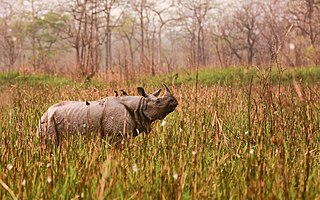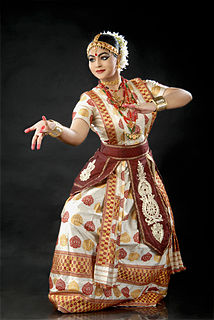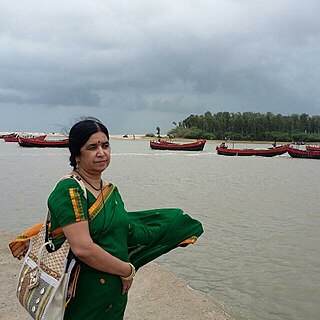
Assam is a state in northeastern India, south of the eastern Himalayas along the Brahmaputra and Barak River valleys. Assam covers an area of 78,438 km2 (30,285 sq mi). The state is bordered by Bhutan and Arunachal Pradesh to the north; Nagaland and Manipur to the east; Meghalaya, Tripura, Mizoram and Bangladesh to the south; and West Bengal to the west via the Siliguri Corridor, a 22 kilometres (14 mi) wide strip of land that connects the state to the rest of India. Assamese and Bodo are the official languages of Assam, while Bengali is an additional official language in the Barak Valley.

Assamese, also Asamiya, is an Indo-Aryan language spoken mainly in the northeast Indian state of Assam, where it is an official language. It is the easternmost Indo-Iranian language, spoken by over 23 million speakers, and serves as lingua franca of the region.

Dispur is the capital of the Indian state of Assam and is a suburb at Guwahati.

Sattriya, or Sattriya Nritya, is a major Indian classical dance. It is a dance-drama performance art with origins in the Krishna-centered Vaishnavism monasteries of Assam, and attributed to the 15th century Bhakti movement scholar and saint Mahapurush Srimanta Sankardev.

Srimanta Sankardev was a 15th–16th century Assamese polymath; a saint-scholar, poet, playwright, dancer, actor, musician, artist social-religious reformer and a figure of importance in the cultural and religious history of Assam, India. He is widely credited with building on past cultural relics and devising new forms of music (Borgeet), theatrical performance, dance (Sattriya), literary language (Brajavali). Besides, he has left an extensive literary oeuvre of trans-created scriptures, poetry and theological works written in Sanskrit, Assamese and Brajavali. The Bhagavatic religious movement he started, Ekasarana Dharma and also called Neo-Vaishnavite movement, influenced two medieval kingdoms – Koch and the Ahom kingdom – and the assembly of devotees he initiated evolved over time into monastic centers called Sattras, which continue to be important socio-religious institutions in Assam and to a lesser extent in North Bengal. Sankardev inspired the Bhakti movement in Assam just as Guru Nanak, Ramananda, Namdev, Kabir, Basava and Chaitanya Mahaprabhu inspired it elsewhere in the Indian subcontinent. His influence spread even to some kingdoms as the Matak Kingdom founded by Bharat Singha, and consolidated by Sarbananda Singha in the latter 18th century endorsed his teachings.

Srimanta Sankaradev Kalakshetra, commonly known as Kalakshetra, is a cultural institution in the Panjabari area of Guwahati, Assam, India, named after the medieval poet-playwright and reformer Srimanta Sankardev. It includes a cultural museum, library, a children's park, and various facilities for preserving, demonstrating and performing cultural items and history. In addition to being Northeast India's largest cultural congregation, the Kalakshetra is also a major tourist spot in Guwahati. Built in the 1990s, the artistic excellence of Assam and rest of the north-eastern region is displayed here. There are eateries, places of worship, emporiums and open-air theatres within the sprawling Kalakshetra premises.

Indira Gandhi National Centre for the Arts (IGNCA), New Delhi is a premier government-funded arts organization in India. It is an autonomous institute under the Union Ministry of Culture.
The Bhagavat of Sankardev is the Assamese adaptation of the Bhagavata Purana made by Srimanta Sankardev in 15th-16th century in the regions that form present-day Assam and Cooch Behar. Though the major portions of the work was transcreated by Sankardev, a few other writers from that period contributed to the remaining sections.

Ekasarana Dharma is a neo-Vaishnavite monolithic religion propagated by Srimanta Sankardeva in the 15th-16th century in the Indian state of Assam. It reduced focus on vedic ritualism and focuses on devotion (bhakti) to Krishna in the form of congregational listening (sravan) and singing his name and deeds (kirtan).

Assamese literature is the entire corpus of poetry, novels, short stories, plays, documents and other writings in the Assamese language. It also includes the literary works in the older forms of the language during its evolution to the contemporary form and its cultural heritage and tradition. The literary heritage of the Assamese language can be traced back to the c. 9-10th century in the Charyapada, where the earliest elements of the language can be discerned.
The fine arts of Assam has an extremely rich tradition.

Prof Bhabananda Deka was a pioneer Assam economist and author who conducted novel research on the economy of the far eastern part of India. He was also a leading Indian-Assamese litterateur of the famed 'Awahon-Ramdhenu Era' of Assamese literature during the mid-20th century. He was the author of a total of 115 English and Assamese books including textbooks on a range of fifteen subjects including economics, ancient Assamese literature, philosophy, education, religion, mythology, archaeology, tribal study, poetry, drama, memoirs, civics, political science, biographies; he also edited books and journals. He also authored a variety of research papers and articles about the state of Assam, a state in the north-eastern part of India. He pioneered the writing of books on Economics in Assamese. His Assamese book Axomor Arthaneeti was the first ever research-based comprehensive book on Assam Economics, which was published for the first time in 1963. He was conferred with the honorary title of 'Asom Ratna' -- 'Jewel of Assam' by the intellectuals of Assam on 19 August 2007 at a public meet held under the presidency of Prof. (Dr) Satyendra Narayan Goswami.

Borgeets are a collection of lyrical songs that are set to specific ragas but not necessarily to any tala. These songs, composed by Srimanta Sankardeva and Madhavdeva in the 15th-16th centuries, are used to begin prayer services in monasteries, e.g. Satra and Namghar associated with the Ekasarana Dharma; and they also belong to the repertoire of Music of Meghalaya outside the religious context. They are a lyrical strain that express the religious sentiments of the poets reacting to different situations, and differ from other lyrics associated with the Ekasarana Dharma. Similar songs composed by others are not generally considered borgeets.
Assamese is part of the easternmost group of the Indo-Aryan languages. History of Assamese literature can largely be classified into three periods, including: Early Assamese period, Middle Assamese period and, Modern Assamese.
Hiren Gohain is a scholar, writer, literary critic, and social scientist from the Indian state of Assam.

Professor Maheswar Neog was an Indian academic who specialised in the cultural history of the North East India especially Assam, besides being an Assamese-language scholar and poet. He was a top Indologist, and his work covers all disciplines of Indian studies, folk-lore, language, dance, history, music, religion, drama, fine arts, paintings, historiography and hagiography, lexicography and orthography, epigraphy and ethnography. His research includes multi-dimensional features of Vaishnava renaissance in Assam through Srimanta Sankardev, Madhabdev, Damodardev, Haridev, Bhattadev and other Vaishnava saints of Assam.

Srimanta Sankaradeva University of Health Sciences, Guwahati, Assam, India is established in 2009 as per The Srimanta Sankaradeva University of Health Sciences Act, 2007. The Srimanta Sankaradeva University of Health Sciences is the only Health Sciences University in the North Eastern Region with its jurisdiction to the whole of Assam.

Mahapurusha Srimanta Sankaradeva Viswavidyalaya is a university established through The Mahapurusha Srimanta Sankaradeva Viswavidyalaya Act, 2013 in the State of Assam, India in 2013. The university is located in Nagaon and is named after him.

Karabi Deka Hazarika is an Indian writer from Assam.

Mayur Bora is an Indian writer, critic and public speaker from Assam. Bora has 18 books to his credit, 16 in Assamese language, 1 in English and 1 book of translation in which noted litterateur Dilip Bora's short stories were rendered into English.














